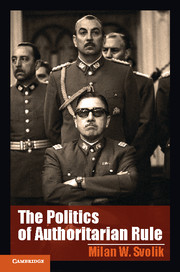Book contents
- Frontmatter
- Contents
- Figures
- Tables
- Acknowledgments
- 1 Introduction: The Anatomy of Dictatorship
- 2 The World of Authoritarian Politics
- PART I THE PROBLEM OF AUTHORITARIAN POWER-SHARING
- 3 And Then There Was One! Authoritarian Power-Sharing and the Path to Personal Dictatorship
- 4 When and Why Institutions Contribute to Authoritarian Stability: Commitment, Monitoring, and Collective Action Problems in Authoritarian Power-Sharing
- PART II THE PROBLEM OF AUTHORITARIAN CONTROL
- Bibliography
- Index
- Other Books in the Series (continued from page iii)
3 - And Then There Was One! Authoritarian Power-Sharing and the Path to Personal Dictatorship
Published online by Cambridge University Press: 05 November 2012
- Frontmatter
- Contents
- Figures
- Tables
- Acknowledgments
- 1 Introduction: The Anatomy of Dictatorship
- 2 The World of Authoritarian Politics
- PART I THE PROBLEM OF AUTHORITARIAN POWER-SHARING
- 3 And Then There Was One! Authoritarian Power-Sharing and the Path to Personal Dictatorship
- 4 When and Why Institutions Contribute to Authoritarian Stability: Commitment, Monitoring, and Collective Action Problems in Authoritarian Power-Sharing
- PART II THE PROBLEM OF AUTHORITARIAN CONTROL
- Bibliography
- Index
- Other Books in the Series (continued from page iii)
Summary
[A]ll principalities known to us are governed in two different ways: either by a prince with all the others his servants, who as ministers (through his favor and permission) assist in governing that kingdom; or by a prince and by barons, who hold that rank not because of any favor of their master but because of the antiquity of their bloodline.
Niccolò Machiavelli, The PrinceAs democracies are subverted when the people despoil the senate, the magistrates, the judges of their functions, so monarchies are corrupted when the prince insensibly deprives societies or cities of their privileges. In the former case the multitude usurp the power, in the latter it is usurped by a single person.
Montesquieu, The Spirit of the LawsAlthough numerous distinct stages can be identified in Soviet history, in terms of the structure of supreme authority there are only two periods: oligarchy and dictatorship. The latter existed only under Stalin.
Khlevniuk, Master of the House (2009, p. 246)Joseph Stalin's ascent to the pinnacle of Soviet power continues to astonish casual observers and to intrigue historians. By the time of his death, Stalin arguably held “the greatest power over the greatest number of people in history” (Suny 1998, 167), an assessment all too grimly affirmed by the millions who perished in the government-directed terror, punitive famines, and deportations during Stalin's rule (see, e.g., Snyder 2010). Stalin, initially just “an obscure associate of more radiant revolutionaries” (Suny 1998, 167), gradually defeated actual and potential contenders within the Soviet leadership and eventually subordinated key institutions within the Soviet political system to his personal authority.
- Type
- Chapter
- Information
- The Politics of Authoritarian Rule , pp. 53 - 84Publisher: Cambridge University PressPrint publication year: 2012



